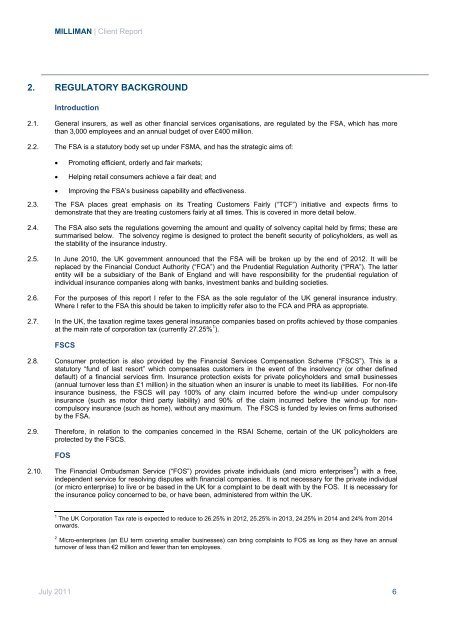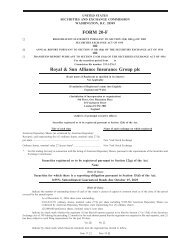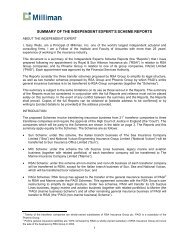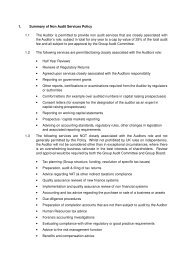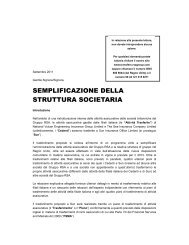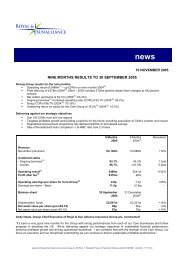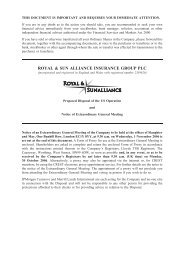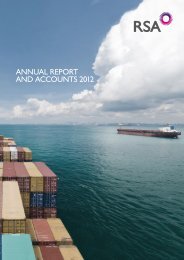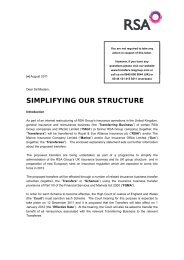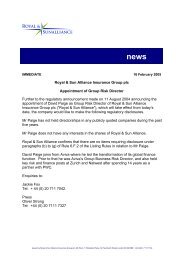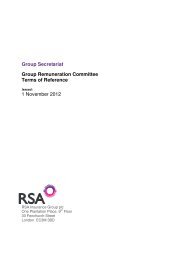MILLIMAN | Client ReportReliances and Limitations1.30. In carrying out my review and producing this Report I have relied, without detailed verification, upon the accuracyand completeness of the data and information provided to me, in both written and oral form, by RSAI. Reliancehas been placed upon, but not limited to, the information detailed in Appendix 5. My opinions depend on thesubstantial accuracy of this data, information and the underlying calculations. I have tested the methodology usedin preparing these documents in the manner outlined in later sections of this Report.1.31. This Report has been prepared for the purposes of the RSAI Scheme in accordance with Section 109 of FSMA.A copy of this Report will be sent to the FSA and will accompany the RSAI Scheme application to the Court.1.32. This Report must be considered in its entirety, since individual sections, if considered in isolation, may bemisleading.1.33. Neither the Report, nor any extract from it, may be published without my specific written consent having beengiven, save that copies of the Report may be made available for inspection by policyholders and copies may beprovided to any person requesting the same in accordance with legal requirements. I also consent to the Reportbeing made available on the website to be operated by RSAI in connection with these transfers.1.34. No summary of the Report may be made without my express consent. I will provide a summary of the Report forinclusion in a document that will be made available to policyholders of RSAI and the policyholders of theTransferors, <strong>Sun</strong> and RSA Re under the RSAI Scheme (the “Report Summary”).1.35. The Report has been prepared within the context of the assessment of the terms of the RSAI Scheme and mustnot be relied upon for any other purpose. No liability will be accepted by Milliman, or me, for any application of theReport to a purpose for which it was not intended or for the results of any misunderstanding by any user of anyaspect of the Report. In particular, no liability will be accepted by Milliman or me under the terms of the Contracts(Rights of Third Parties) Act 1999.1.36. Actuarial estimates are subject to uncertainty from various sources, including changes in claim <strong>report</strong>ing patterns,claim settlement patterns, judicial decisions, legislation, economic and investment conditions. It should thereforebe expected that the actual emergence of claims, premiums, expenses and investment income will vary from anyestimate. Such variations in experience could have a significant effect on the results and conclusions of thisReport. No warranty is given by Milliman or me that the assumptions, results and conclusions on which thisReport is based will be reflected in actual future experience.1.37. This review does not comprise an audit of the financial resources and liabilities of the Transferors, <strong>Sun</strong>, RSA Reor RSAI.1.38. This Report should not be construed as investment advice.1.39. At the date of this Report, I am not aware of any material changes in circumstances since 31 December 2010other than those referred to in this Report. This Report also takes no account of any information that I have notreceived, or of any inaccuracies in the information provided to me.1.40. The use of Milliman’s name, trademarks or service marks, or reference to Milliman directly or indirectly in anymedia release, public announcement or public disclosure, including in any promotional or marketing materials,websites or business presentations is not authorised without Milliman’s prior written consent for each such use orrelease, which consent shall be given at Milliman’s sole discretion.Professional and Regulatory Guidance1.41. I am required to comply with relevant professional standards and guidance issued by the Board for ActuarialStandards and the Institute and Faculty of Actuaries, including the current version of Guidance Note 12 (effectivefrom 1 December 2010). I have complied with such standards, subject to the principles of proportionality andpracticability.1.42. The Report has been prepared under the terms of the guidance set out in chapter 18 of the Supervision Manual(“SUP18”) contained in the FSA Handbook of Rules and Guidance to cover scheme <strong>report</strong>s on the transfer ofinsurance business.July 2011 5
MILLIMAN | Client Report2. REGULATORY BACKGROUNDIntroduction2.1. General insurers, as well as other financial services organisations, are regulated by the FSA, which has morethan 3,000 employees and an annual budget of over £400 million.2.2. The FSA is a statutory body set up under FSMA, and has the strategic aims of:• Promoting efficient, orderly and fair markets;• Helping retail consumers achieve a fair deal; and• Improving the FSA’s business capability and effectiveness.2.3. The FSA places great emphasis on its Treating Customers Fairly (“TCF”) initiative and expects firms todemonstrate that they are treating customers fairly at all times. This is covered in more detail below.2.4. The FSA also sets the regulations governing the amount and quality of solvency capital held by firms; these aresummarised below. The solvency regime is designed to protect the benefit security of policyholders, as well asthe stability of the insurance industry.2.5. In June 2010, the UK government announced that the FSA will be broken up by the end of 2012. It will bereplaced by the Financial Conduct Authority (“FCA”) and the Prudential Regulation Authority (“PRA”). The latterentity will be a subsidiary of the Bank of England and will have responsibility for the prudential regulation ofindividual insurance companies along with banks, investment banks and building societies.2.6. For the purposes of this <strong>report</strong> I refer to the FSA as the sole regulator of the UK general insurance industry.Where I refer to the FSA this should be taken to implicitly refer also to the FCA and PRA as appropriate.2.7. In the UK, the taxation regime taxes general insurance companies based on profits achieved by those companiesat the main rate of corporation tax (currently 27.25% 1 ).FSCS2.8. Consumer protection is also provided by the Financial Services Compensation Scheme (“FSCS”). This is astatutory “fund of last resort” which compensates customers in the event of the insolvency (or other defineddefault) of a financial services firm. <strong>Insurance</strong> protection exists for private policyholders and small businesses(annual turnover less than £1 million) in the situation when an insurer is unable to meet its liabilities. For non-lifeinsurance business, the FSCS will pay 100% of any claim incurred before the wind-up under compulsoryinsurance (such as motor third party liability) and 90% of the claim incurred before the wind-up for noncompulsoryinsurance (such as home), without any maximum. The FSCS is funded by levies on firms authorisedby the FSA.2.9. Therefore, in relation to the companies concerned in the RSAI Scheme, certain of the UK policyholders areprotected by the FSCS.FOS2.10. The Financial Ombudsman Service (“FOS”) provides private individuals (and micro enterprises 2 ) with a free,<strong>independent</strong> service for resolving disputes with financial companies. It is not necessary for the private individual(or micro enterprise) to live or be based in the UK for a complaint to be dealt with by the FOS. It is necessary forthe insurance policy concerned to be, or have been, administered from within the UK.1The UK Corporation Tax rate is expected to reduce to 26.25% in 2012, 25.25% in 2013, 24.25% in 2014 and 24% from 2014onwards.2Micro-enterprises (an EU term covering smaller businesses) can bring complaints to FOS as long as they have an annualturnover of less than €2 million and fewer than ten employees.July 2011 6


